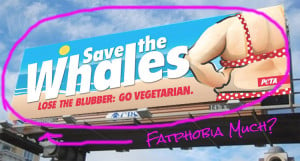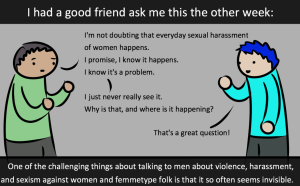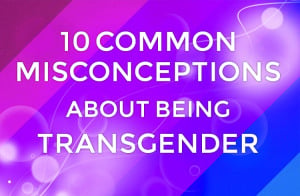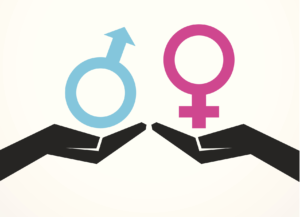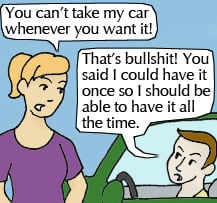
A couple sits across from one another, toasting with wine glasses, with two plates of food on the table before them.
I have a weird relationship with chivalry.
On the one hand, I believe women are capable of anything and everything and don’t need anyone to pay for their meals, open doors for them, or any of that stuff.
On the other hand, I like when people do it to me. Okay – not just like. I absolutely love it.
When I’m on a date with a guy I like and the bill comes and he tells me he’ll take care of it, I do a little dance inside.
Because that means he definitely views this as a date. And that he likes me enough not only to make it loud and clear that this is a date, but also to give me a little gift by paying for my dinner. It feels like a way of saying, “I appreciate your being here with me.”
And I feel guilty that I like that – because while you will always find me offering to pay for my own half of my bill, you won’t often find me insisting that I cover the whole thing myself. Double standard much?
Yup, I’ve definitely struggled with the possibility that this makes me a bad feminist.
Because the whole notion of chivalry comes from the blatantly anti-feminist idea that women are inherently weak and incapable.
After all, this tradition arose from a time when women were expected to rely on men financially and were thought to owe men sex in exchange for financial support. This prescription for relationships denies women their sexual autonomy and financial independence and fosters a sense of entitlement in men.
But here’s the thing about the whole notion of a bad feminist: It holds women accountable for their own oppression.
Women are taught to care about their looks, and then they’re “bad feminists” if they do. They’re taught to prioritize family over work, and then they’re “setting women back” if they do.
And women and other people perceived as feminine – especially those who date people perceived as masculine – are taught to embrace dating conventions that arose from a time when women were considered objects to be exchanged and were financially reliant on men. Then, when they come to enjoy aspects of these traditions, they end up feeling bad about it.
Yes, there’s a history of men financially supporting women in exchange for entitlement to their bodies and lives. But that doesn’t mean everyone who pays for my half of the bill views it as a price for my body or the result of any inability on my own part.
So in this exchange, we should be aware of the difference between entitlement based on harmful gender norms and kindness that anyone is free to consent to giving or taking, regardless of who they are.
A quick note: As a feminine-presenting person who typically dates masculine-presenting people, I have a specific perspective on this that is based on heteronormative gender roles. I’m writing from that perspective, but this also may apply to people in LGBTQIA+ relationships in which one partner is perceived as more masculine or feminine than the other.
Usually, I can get a read on whether or not someone’s sexist based on other aspects of their behavior, so I can tell when somebody’s offering to pay because he buys into gender roles and when he’s just doing it out of generosity. If it’s the latter, that’s a trait I look for in a partner, so I see it as a positive.
In fact, it’s especially important to me because I was financially abused by an ex-partner who expected me to pay for everything, so observing someone do the opposite makes me feel safer with them.
My general view on finances in relationships is that there are no rules. Of course men should be able to cover their dates with women – as long as this can also work the other way around or in LGBTQIA+ relationships. Treating someone to dinner is a nice thing to do, regardless of the person’s gender.
People should also be able to split the bill, have whoever initiated the date pay, or literally do anything under the sun that works for them. Feminism means people don’t have to do what gender roles dictate. It doesn’t mean they can’t participate in behaviors that mirror those norms.
But that still begs the question: If paying for dates is really about generosity, not sexism, why don’t men and women do it equally?
As it stands, 84% of straight men and 60% of straight women say that in their relationships, the guy pays for most of the expenses. Shouldn’t that be 50%?
In a faraway land where gender inequality never existed, yes.
But in the world we live in, many women are socialized to like it when men foot the bill. They might come to see it as a sign of politeness, considerateness, or interest. It can indicate these traits in anyone, but we’re taught to look for other signs in women, like laughing at jokes or listening empathetically.
Yes, this is problematic, but it’s reality.
So, it makes sense that many women’s appreciation for men who cover dates hasn’t completely died down as feminism has risen. Women themselves are not to blame.
In addition, women make less money than men and therefore are often less likely to be able to finance their relationships themselves.
There are a few situations, however, when men covering dates gets problematic.
One is when either party feels any pressure to treat the other person. When we offer our money not out of our own free will, but out of pressure, that borders on financial abuse – the use of money to manipulate someone.
And because of how we’re socialized, men might feel that pressure without their dates even saying anything. That’s why I always get out my wallet when the bill comes at the end of a date. I want to make it clear that while I appreciate any effort on behalf of a date to treat me, I would never hold it against them if they don’t.
For the same reason, people shouldn’t have to feel pressure to cover a date because their partner covered the last one – not even if that pressure is felt in the name of gender equality. Your financial boundaries are yours to set. If a mutual exchange is expected, that should be agreed on beforehand.
The other potentially problematic situation is when the offer is viewed as part of an exchange – or at least when it’s viewed that way by default.
A drink, meal, or movie ticket is a gift, not a price someone pays for your affection, and certainly not a price for sex.
I have nothing against sex work, sugar arrangements, or anything like that if all parties agree to it. Again, people should be allowed to do whatever works for them. But even in those cases, nobody is entitled to sex with another person.
The assumption that a woman owes a man something because he paid for her date contributes to rape culture.
When we view sex as something a woman “gives” a man in exchange for financial support provided on a date or in a long-term relationship, we forget that it should be mutually enjoyed and consensual. We also imply that offering money entitles someone to someone else’s body, which it never does.
So, any offer by anyone to cover the bill for a date must be made unconditionally. After all, what makes it nice is that it’s a kind of gift, and it should feel that way, regardless of gender.
***
Does the little dance I do in my head when a guy tells me to put away my wallet have problematic roots? Heck yes.
Does this mean I need to give it up? As long as I’m not exerting any pressure on him to pay and he’s not exerting any pressure on me to give him something in return, no.
There are a lot of things I like – makeup, cute animals, and yes, guys paying for dates – that I probably like at least partially due to gender roles. But asking women to give up something that makes them happy because it has oppressive roots is punishing them for their own oppression.
Ultimately, the reasons why you like something aren’t relevant to whether or not you should do it. What’s the point of dating if you can’t do what makes you happy?
So, to answer the question I started off with, no: Accepting or even liking when a man covers your date doesn’t make you a bad feminist. It just makes you a person with preferences – preferences that are affected by the society you live in but don’t make you responsible for that society’s problems.
[do_widget id=’text-101′]
Suzannah Weiss is a Contributing Writer for Everyday Feminism and a New York-based writer whose work has appeared in The Washington Post, Salon, Seventeen, Buzzfeed, The Huffington Post, Bustle, and more. She holds degrees in Gender and Sexuality Studies, Modern Culture and Media, and Cognitive Neuroscience from Brown University. You can follow her on Twitter @suzannahweiss.
Search our 3000+ articles!
Read our articles about:
Our online racial justice training
Used by hundreds of universities, non-profits, and businesses.
Click to learn more











